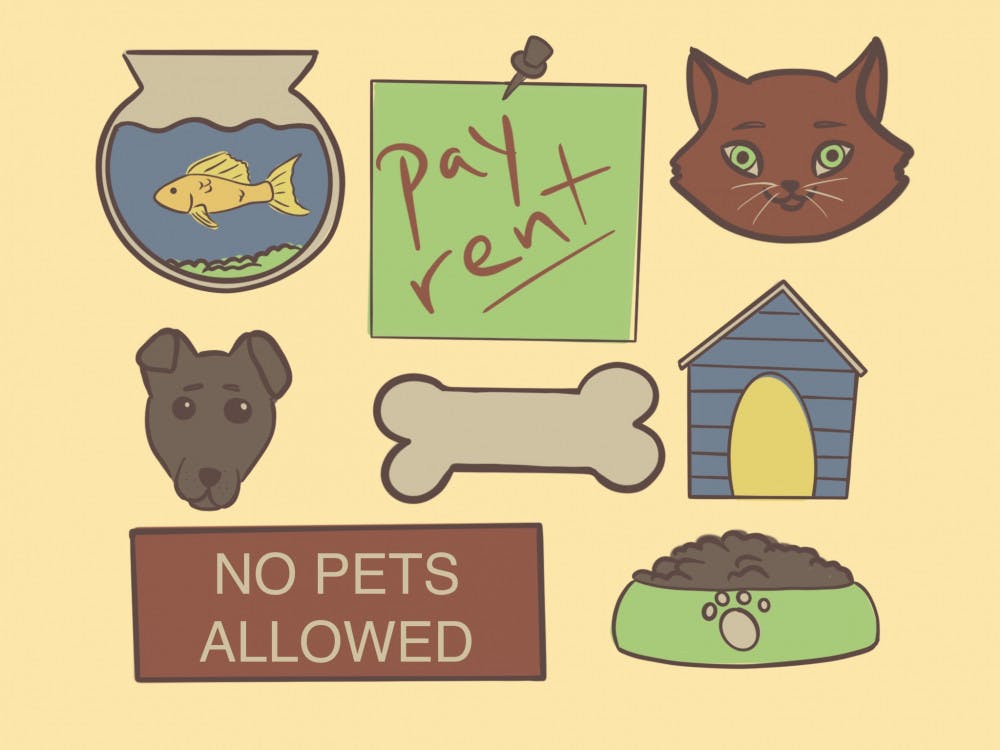Laura Junio thought she’d be homeless by this week. She knew her family would manage, she said, but she was afraid they would have to give away their pets.
Due to unexpected car payments that have left her unable to pay rent since April, Junio, 57, was facing eviction from Tower Oaks Glen Apartments until she found a way to temporarily extend her stay in her current home. She planned to stay with GRACE Marketplace, a taxpayer-supported group that offers shelter and essential services for those in need, where pet care is only offered to two pets per household.
In Alachua County, low-income residents often struggle to find affordable housing, according to the UF Shimberg Center for Housing Studies. For every 100 extremely low-income renter households, there are only 23 affordable and available rental units in Florida.
And while COVID-19 has taken a financial toll on many, families who already struggle to pay rent are at risk of falling further behind. This could leave them, and their pets, homeless.
As a result, the Humane Society of North Central Florida believes that many may soon be forced to give up their pets to afford housing, said director of advancement Margot DeConna. This could be due to a lack of affordable homes that allow pets, or families having to prioritize rent and other necessities before pet-related expenses.
Junio has already given away her corn snake, Leana, but said she refuses to give up her three dogs, Darrien, Xena and Heartz.
“I won’t dump them off,” she said, “even if we starve.”
She has since decided to sell land she owns in Lee, Florida, near Tallahassee, to pay her rent and has made a deal with her landlord allowing her to stay while she finds someone to buy it. She said she no longer has to separate from her pets.
“To know that I get to keep them is just the most amazing feeling,” Junio said.
The Humane Society is advocating for increased rental assistance for low-income renters, for those who can to foster pets and for landlords to remove restrictions on pets.
The group is hoping these changes will prevent people facing eviction or homelessness from having to give up their animals.
The most helpful thing community members can do to help is temporarily home pets while their owners get back on their feet, DeConna said.
“Anything that we can do on this end to prevent this from happening, we're willing to do,” DeConna said. “We want keeping pets and people together to be a priority in the minds of our local lawmakers.”
When Alachua County Animal Services director Ed Williams moved to Gainesville with his three dachshunds, he said he struggled to find a place to rent where he didn't have to pay expensive pet fees.
“I remember applying and they told me ‘Oh, we want a pet deposit and we want like $50 a month for each pet,’” Williams said. “And for three little dogs it was about $150 a month extra. I'm like, ‘Are you kidding?’”
The number one reason people surrender animals to Alachua County Animals Services is problems with housing, he said. This usually means people have to move into a place that doesn’t allow pets. Even though he was able to find a place that allowed him to bring his dogs, he said low-income families often don’t have the same luxury.
Even outside of a pandemic, Williams said he would like to see these restrictions on pets in rental spaces lifted.
“I think that would provide a lot more access to people in the Gainesville housing market,” he said.
But the most immediate effects of this pet and owner separation are clear. While Junio is relieved she no longer has to part ways with her dogs, she said she knows others may not be as lucky.
“I’m worried about them,” she said. “And I’m praying for them.”

Nora O'Neill is a fourth-year journalism and philosophy student and the Enterprise Editor for The Alligator. She previously served as the Avenue Editor and the business and economics beat reporter. In her free time you can find her reading books with no plot and abusing her Chemex.






